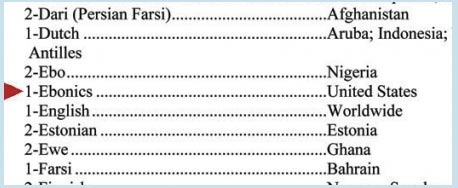
The US Department of Justice is looking to hire (and I quote), Ebonics experts, to help monitor, translate, and transcribe the secretly recorded conversations of persons who are the subject of narcotics investigations. The Smoking Gun has details, and scans of the original documents (a detail is shown above).
Understandably, there is much outrage over the use of the word “Ebonics” in the ad. The term became a flashpoint for racially-charged ridicule a little over a decade ago: the Oakland, CA, school board caused national uproar when it proposed teaching some students in Ebonics.
Here’s an interesting quote from Linguistic Society of America member John Braugh, from an ABC News article. He believes the choice to use the word “Ebonics” may have been ill-advised, but that African-American English has an important place in American cultural history:
While African-American English may seem like a uneducated form of traditional English to some, Baugh said it has roots in the slave trade, when Africans with no access to education were forced to find a shared language. Slave-traders, he explained, would often separate groups of slaves who spoke the same dialect, leaving the men and women with no way to verbally communicate. So they learned a rough version of standard English together, without the help of formal education or literacy skills.
“To say that it’s a bastardization is cruel,” he said. “The reality is that the linguistic consequences of slavery are greatly misunderstood.”
[via BB Submitterator, thanks Inconsequentiallogic]